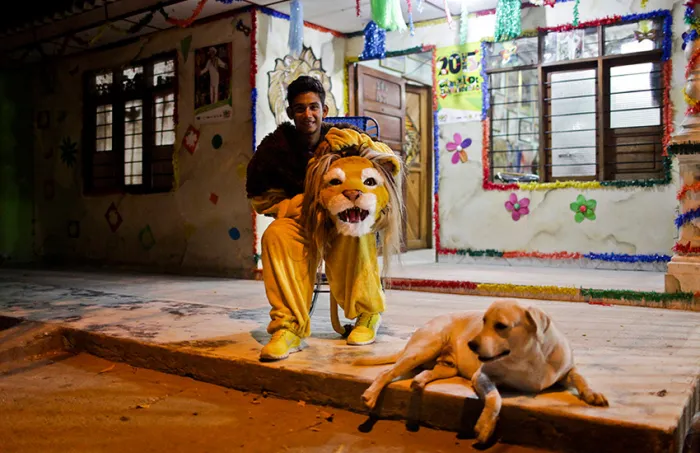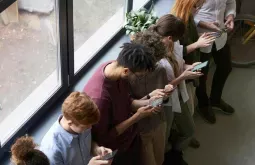Barranquilla behind the masks

“When I become an animal, I forget that I am a human being,” says Joseph Geralino (21), a member of African Jungle group in the annual Barranquilla carnival. As a faithful Barranquero, he has been participating in the carnival as far as he remembers. This year will be no exception. Not for Joseph who will become a lion, not for Orlando Camacho (57) who will put on a mask of a woman, not for Giselle Massard (33) who will embody Hindu deity Ganesh. It definitely won’t be an exception for the entire Barranquilla that will disguise itself and transform as a city.
The Lion King
Joseph arrives at the workshop of a mask maker Jose Llanos (crowned as King Momo of this year’s carnival) immediately having learnt about the chance to speak about his mask. The 21-year-old lives just across the street in the rather poor neighborhood of Galapa. There he stands surrounded by the numerous masks and carnival costumes that are casually hanging on the washing line like freshly washed clothes. His companions are black, giant gorillas with screaming faces and sharp teeth, tigers with neatly colored orange and white stripes, bulls that look serious and noble with their white, bulging eyes. Joseph has embodied all of these animals in the previous carnivals, and even more – panther, tiger, jaguar, last year he was gorilla. There is one, however, that he hasn’t become yet – a lion. “Lion is the king of the jungle, the leader and one of the toughest animals in the [African Jungle] group.” The choice was clear to him already last February, at the end of the last carnival.
Three weeks before the carnival, Joseph is thinking about his performance in the parade. As the dances don’t have any choreography, his moves will be spontaneous. “My clothes can’t be tight, because that would make me look fragile and delicate. I have to be extrovert and dynamic,” he says. The lion’s mask fits very well with Joseph who considers himself a leader in life. “I am the one who coordinates the course at my university,” says the student of graphic design.
Becoming a woman
Also Orlando has always embodied animals, such as a bull, in his El Torito Ribeņo group. This year he decided to go for something else. He will become a woman.
The psychiatrist Isabel Prado Misas says it’s not the person who chooses a mask. “It’s the mask that chooses a person,” she believes. “People usually tend to choose masks that trigger something inside themselves. It’s a subconscious process. You immediately create a mental dialogue with a mask.”
Something special must happened on those evenings Orlando watches the TV soap opera Casa de Reinas (House of Queens). He has become very attracted to the character Cara de Bagre, known as the “catfish face”. In the soap opera she plays the role of Queen Caroline. “She has a weird smile. And the way she laughs is peculiar!” Orlando explains his choice.
Orlando refuses to show any characteristics of Cara de Bagre. “I haven’t really practiced my role that well yet,” he shyly explains standing on a street at San Roque neighborhood in his loose, yellow-and-green colored bull’s costume he wore previous years. This year’s costume of a nice, colorful woman’s dress and a face with the broad smile of Cara de Bagre is still to be prepared. The same for the role: he is spending one hour each day watching his character in the soap opera and crafting her smile on the mask.
Only late in the evening can he watch television. “I am normally very busy,” he says. The 57-year-old Orlando works as a handyman and lives with his mother, two sisters and a brother. His children and grandchildren live separately as he is divorced.
Orlando says he feels excited and proud to become Cara de Bagre, the funny character from the soap opera with a rather ugly face. However, he rarely smiles or laughs, his voice is slow and considerate, his eyes – sad and empty. “I am usually a very calm and respectable man in my neighborhood,” he says. Attention is what drives him to put on a mask and become someone else. And he knows he will get the attention at the carnival. “I want to involve people, make them come closer, take photos with me. Especially I like to involve kids,” he says.
Namaste, ganesh!
For Giselle, carnival is a ritual. This year she is going to put on a mask of Ganesh. This Hindu deity is not just a coincidence in Giselle’s life. The inscription on her apartment door says “Namaste” (salutation in India). The image on her desktop background is Ganesh with its elephant’s head and human body. On the top of an empty parrot’s cage in her living room lies a mask with white long trunk and carved eyes. Three weeks before the carnival, it’s not finished yet. Giselle still needs to add orange, yellow and red colors, get a sword and Lotus flower for her costume. “I always like to feel the character!” She is enthusiastic.
She doesn’t speak about Ganesh immediately. Having arrived home from her work, she apologizes for the messy room. Her day started at 5.30 in the morning when she had to get up for gym. “I am fat these days, and I need to lose some weight for the carnival,” she is honest. After gym, she went for work. Giselle is a journalist. It is 4pm when she gets back home in her one bedroom apartment. She starts putting her things in the order pacing the room from one corner to the other. At the same time she is speaking about the carnival. It’s important for her to explain its history, to tell about the main and the oldest parade Battle of Flowers, different groups that participate in the carnival and how she found her group Disfrazate Como Quieras (Wear the costume you want). She shows the photos of her costumes from previous eleven years. All of her masks – globe, octopus, eye, the Caribbean wind and others – have been carefully prepared. She agrees that they even look complicated with many colors and details. Just like her apartment – crammed with all kinds of small things, figures, gifts, souvenirs, paintings.
“Let’s speak about Ganesh,” she suddenly proposes as she has sat down on a couch. Only then she explains her choice of this year’s mask. “I’ve been looking for something spiritual in my life,” she says. Even though Giselle is Catholic, she is not fond of church as an institution. Some years ago she realized she wanted to find her own God. “It started with this one,” she says and takes off a pendant from her neck. It has a small image of Ganesh. “A very special person gave it to me seven years ago. Since then, I feel I have to wear it every day. I feel it protects me.” However, it was only last year that Giselle started to think about the figure that hangs on her neck. She decided to read about Ganesh. That was also the time she became concerned about the way human beings destroy nature. “I found that God is universe, and Ganesh is a God of the universe,” she says. After lots of readings and research she came to the moment when she said: “Oh My God, it’s the same way I think!”
It doesn’t always happen that Giselle knows what mask she is going to wear long in advance. This year she knows. “Why don’t I make a ritual for Ganesh?” she asked herself in December last year. This will be the first time she wears a mask of already existing character, something that will she feels will be a ritual for her soul.
Barranquilla in a mask
“Sometimes mask says more about the person than the face,” Alberto Salcedo Ramos, Colombian journalist and writer refers to Oscar Wilde. Not everyone prepares an individual mask for the carnival. Many people choose to disguise themselves in traditional masks like mocking Marimondas – hooded figures with long noses, floppy ears and bright trousers and vests. If not Marimondas – the most popular costume and the only one that originated in Barranquilla –, celebrators might dress into costumes of European or African origin, like El Congos, or wear costumes of traditional dance groups such as El Cumbia or El Garabatos.
Whatever the costume, the carnival will overwhelm the whole Barranquilla, the largest port city in Colombia, where the advantage of Caribbean, mix of cultures and nationalities have developed a strong carnival tradition.
“The whole carnival becomes a mask. Everyone becomes free, and the city transforms,” says Alberto Salcedo Ramos. He thinks that the mask is used to erase the differences and inequality that exist in the city. “Everyone comes together, and all become one,” he says stressing the unity that is created. The psychiatrist Isabel Prado Misas agrees with him. “You can find rich people and poor people enjoying the show and dancing to the same music,” she says. Moreover, she calls these four days of the carnival a catharsis, release of social pressure. „People in Barranquilla are very expressive, social, friendly, loud and spontaneous. The fact that we have the carnival shows the way we are. I wouldn’t imagine this city and people without a carnival.”
“You feel the energy of the people. Once you experience parade, everything changes!” says Giselle as she slides into hammock overlooked by her to-be-finished Ganesh mask. She is truly looking forward to her 12th Barranquilla carnival.






